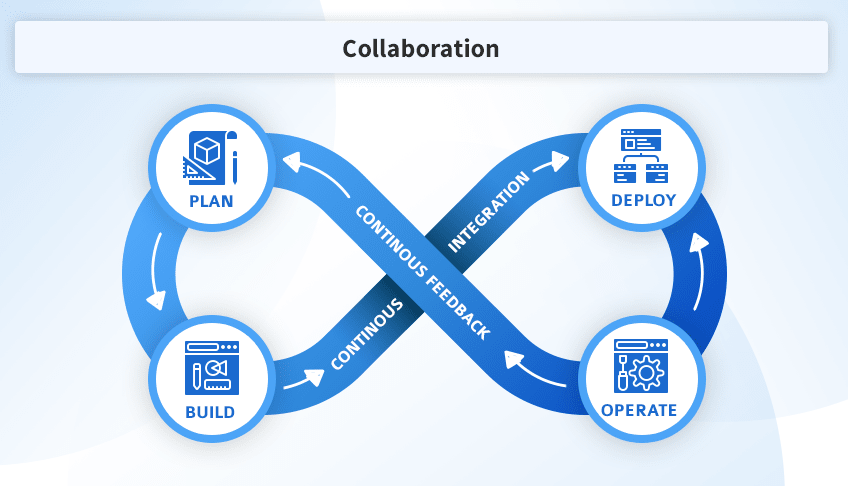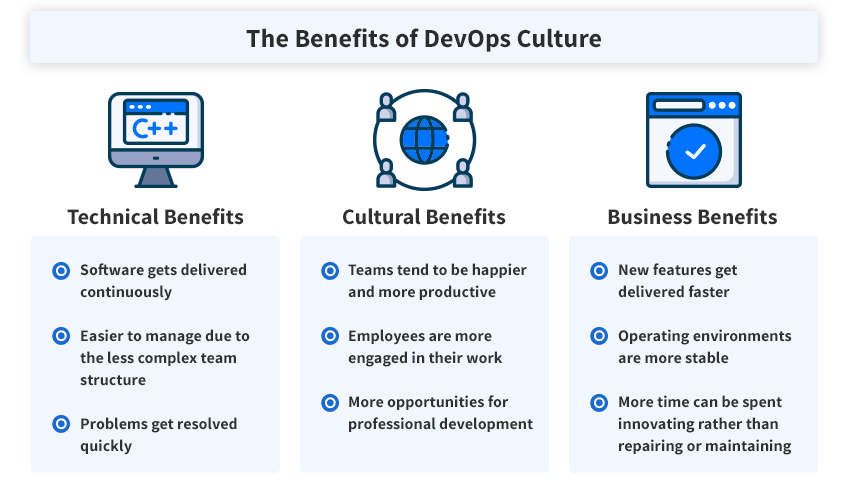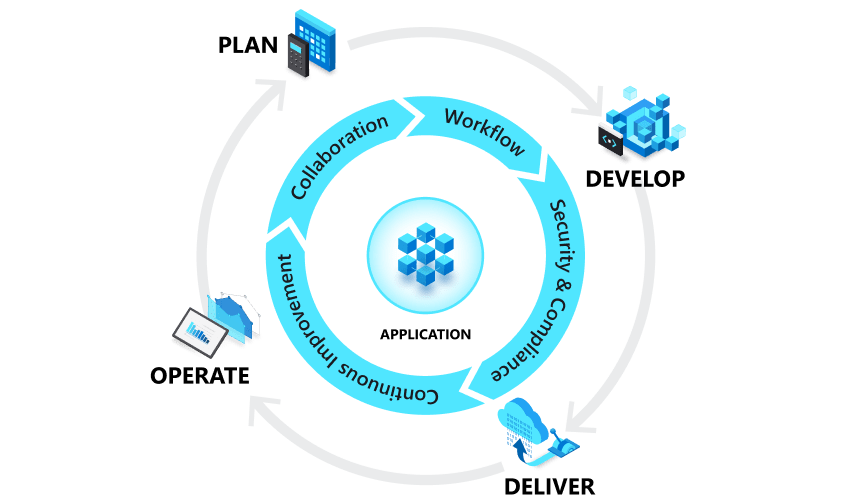The old adage “teamwork makes the dream work” definitely applies to engineering.
If your team is missing deadlines, working in silos, and more concerned with the process than the end results, your development culture may be broken.
There’s no simple fix to cultural problems. But there are technology solutions that help you better identify problems and create systems and processes that could be the solution.
Microsoft’s Azure DevOps is a system that might hold this ability.
With a wide range of DevOps tools suited for organizations of all sizes, Microsoft’s ALM is more than just window dressing for the engineering workflow. It makes implementing DevOps best practices easier — which is one way to create a healthier culture and more effective engineering teams.
In fact, teams that have embraced DevOps have seen massive improvements in speed, efficiency, and quality of work.
So, if DevOps can help your team do better work more quickly and with less hassle, then you need tools and systems that help you implement and adhere to those practices.
This is how Azure DevOps can help.
Defining DevOps
DevOps, at its most basic, is a union of the development and operations teams. Rather than keeping them siloed from one another, it combines the people, process, and products, and promotes collaboration between multidisciplinary teams to share work and tools. This paves the way for modern development practices like agile planning, continuous integration, continuous delivery, and close monitoring of applications, always with an eye toward continuously delivering value to the end user.
But, DevOps isn’t just a matter of practice. It’s cultural.
So let’s dig in there.
Beyond the Functional: DevOps Culture
If you’re implementing DevOps practices, chances are that you’re looking for a new and better way to manage your team’s engineering efforts. But the practices are only the first step.
Step two in the journey is promoting DevOps culture, which stresses having small, multidisciplinary teams that can work both autonomously and collaboratively with other teams.
DevOps teams are hyper-focused on making the customers’ actual experiences better, which means they take collective accountability for how the end user experiences the software they create.
This means there are no silos. If something fails, the entire organization shoulders the blame and works to correct it.
There are a couple of important values in DevOps culture:
1. Agile Practices: DevOps culture means using agile practices to eliminate waste throughout the organization. Small teams work in small batches, focusing on providing end-to-end value for the user.
2. Growth Mindset: DevOps teams are always thinking about growth, creating and testing hypotheses, monitoring their processes and gathering results in real time. When a hypothesis fails, they quickly ascertain why and apply that knowledge to a new attempt. When a hypothesis is successful, DevOps teams can quickly replicate the processes that led them to success.
3. Competencies, Not Roles: DevOps teams don’t think of their people in terms of their job titles or roles. They think of the team as a whole, where each person brings a variety of competencies in development, operations, or both. Successes are the whole team’s successes. Failures are the whole team’s failures. The entire team shoulders the responsibility of delivering end-user value at every step of application creation.
Why Is DevOps Culture Beneficial?
There’s a reason DevOps has become one of the most sweeping trends in software development over the last several years. With a small group made of talented, multidisciplinary people collaborating together, DevOps teams can work quickly and innovate on the fly.
If you need more proof why DevOps is the future of software development, just look at a few of the numbers from Puppet’s annual State of DevOps report. It found that organizations that have implemented DevOps see:
- 200 times more frequent deploys
- 24 times faster recovery times
- 3 times lower change failure rates
If you’ve seen enough to be convinced that implementing DevOps in your organization is the right path forward, Azure DevOps products are the perfect place to start.
How Microsoft Azure DevOps Can Help
No matter your organization’s goals in implementing DevOps, Azure DevOps and its suite of ALM products may be a simple solution. With more than 100 different tools that help your teams build, deploy, and manage applications (in the cloud, onsite, and on the edge), the software simplifies the process of implementing DevOps and can help greatly improve your development culture.
Consider all of the DevOps application lifestyle phases, and the ways Azure DevOps tools can enable your teams to provide continuous end user value throughout each stage.
Plan
In the planning phase, teams need to be able to move with agility and have full visibility across every project and product they’re creating.
- Azure Boards can help teams define, track, and lay out work.
- Microsoft’s Power BI can help teams visualize analytics and glean valuable insights from data to ensure they’re always improving and always delivering new value to the end user.
Develop
In the development phase, teams can use tools like:
- Visual Studio or Visual Studio Code to work both smarter and faster.
- GitHub can help developers keep their coding efforts transparent, share their work with other team members, and work collaboratively.
- Azure Pipelines allows teams to automate testing and push continuous integration.
- GitHub Actions helps automate workflows.
- Azure DevTest Labs can provision environments for developers faster than any other tool around.
Deliver
In the delivery phase, there are even more Azure tools that can help DevOps teams do their work.
- Azure Resource Manager or HashiCorp Terraform helps teams define and start multiple cloud environments.
- Azure Pipelines creates the continuous delivery pipelines they need in all of those environments.
Operate
And finally, in the operations phase, there are tools like:
- Azure Monitor, which delivers actionable alerts to teams and helps them gain insights from logs and telemetry.
- Azure Automation, where teams can manage their cloud environments.
- Azure Blueprints, where teams can ensure their applications and provisioned infrastructures stay in compliance.
- Azure Safety Center, where teams can quickly find and eliminate security vulnerabilities.
These are just some tools Azure offers that a DevOps team can take advantage of. But not every team will use the exact same tools, especially considering how many different DevOps tools Azure offers. To use Azure DevOps to reach your team’s full DevOps potential, you’ll want to look at this shift from a higher level.
7pace Timetracker is the only integrated, professional time management solution for teams using Azure DevOps.







Top comments (1)
I strongly disagree because a tool cannot fix your development issues. In fact, you probably will generate more problems, and the bills will growth if for example, you don't optimize you pipelines... etc